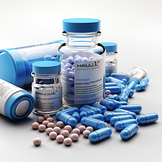Can you take viagra after a heart attack or with heart medication?
- Introduction to Viagra and Heart Conditions
- Study from the Journal of the American College of Cardiology on Erectile Dysfunction Drugs Post-Heart Attack
- Resuming Sexual Activity After a Heart Attack: Insights from Harvard Health Publishing
- Precautions when using Nitrates and PDE5 Inhibitors
- The Safety of Viagra in Stable Cardiovascular Diseases
- The Relationship Between Angina and PDE5 Inhibitors
- PDE5 Inhibitors and their Effects on the Cardiovascular System
- Safe Use of Viagra and Other PDE5 Inhibitors After a Heart Attack
- Recommendations from the British Heart Foundation
- Consultation with Your Doctor Before Taking Viagra or Other PDE5 Inhibitors

Introduction to Viagra and Heart Conditions
Viagra, also known as sildenafil, is a drug often associated with treating erectile dysfunction (ED). It falls under a group of medications known as phosphodiesterase 5 (PDE5) inhibitors, alongside Cialis (tadalafil), Levitra (vardenafil), and Stendra (avanafil). Despite their prevalent use in addressing ED, questions often arise about their safety in individuals with heart conditions, particularly those who have experienced a heart attack.
Study from the Journal of the American College of Cardiology on Erectile Dysfunction Drugs Post-Heart Attack
According to a study published in the Journal of the American College of Cardiology, men who resumed taking erectile dysfunction drugs after a heart attack had a significantly lower risk of dying from any cause, experiencing a new heart attack, or being admitted to the hospital with heart failure. Therefore, the use of PDE5 inhibitors can be an integral part of maintaining an active sex life post-heart attack, under proper medical supervision.
Resuming Sexual Activity After a Heart Attack: Insights from Harvard Health Publishing
Harvard Health Publishing suggests that it is usually safe to resume sexual activity within a week after a heart attack, provided that you're comfortable with moderate aerobic activity, such as brisk walking. Viagra and other PDE5 inhibitors can be considered as part of your post-heart attack treatment plan, but only after discussing it with your healthcare provider.
Precautions when using Nitrates and PDE5 Inhibitors
It's crucial to note that PDE5 inhibitors should not be taken with nitrates, a common treatment for chest pain (angina), or heart medications that contain nitrates, like GTN. If taken together, they can cause a serious and potentially dangerous drop in blood pressure.
For safety, a gap of at least 24 hours is recommended before taking a PDE5 inhibitor if you're on a nitrate such as GTN. For alpha-blockers, another group of heart and blood pressure medications, a gap of at least 4 hours is advisable.
The Safety of Viagra in Stable Cardiovascular Diseases
Research suggests that in cases of stable cardiovascular diseases, including heart failure, hypertension, and coronary artery disease, Viagra is generally considered safe. However, this should not replace a thorough consultation with your doctor, considering the nuances and complexities of individual health conditions.
The Relationship Between Angina and PDE5 Inhibitors
Angina, a symptom of coronary artery disease, can sometimes be triggered by sexual activity. PDE5 inhibitors can help in managing erectile dysfunction in such cases, but should not be used in patients who take nitrates for angina due to the risks mentioned earlier. This is important information to discuss with your healthcare provider if you have angina.
PDE5 Inhibitors and their Effects on the Cardiovascular System
PDE5 inhibitors work by relaxing blood vessels, allowing for increased blood flow, an effect not only beneficial for erectile function but also helpful for certain heart conditions. Yet, they can also slightly lower blood pressure, which may be a concern for those already on blood pressure-lowering medication. This potential interaction underlines the necessity of consultation with a doctor before starting any ED medication.
Safe Use of Viagra and Other PDE5 Inhibitors After a Heart Attack
The British Heart Foundation recommends that patients who have undergone procedures such as stent implantation or bypass surgery wait for at least 6 weeks before taking PDE5 inhibitors like Viagra. This ensures that the heart has had ample time to heal and stabilize before the medication is introduced.
Recommendations from the British Heart Foundation
As per the British Heart Foundation, using Viagra or other PDE5 inhibitors is generally safe if your heart disease is stable.
However, you must consult your healthcare provider first.
In certain cases, where there's an interaction with other heart medications, alternative treatments for erectile dysfunction may be explored.
Consultation with Your Doctor Before Taking Viagra or Other PDE5 Inhibitors
Before you decide to take Viagra or any other PDE5 inhibitors, it is important to discuss it with your doctor. Be transparent about your medical history, any heart conditions you have, or the medication you're currently on. This will help ensure that the drug will be safe and effective for you, and prevent any potential harmful drug interactions, especially with heart medication. If you're on blood thinners, your doctor will guide you on the best way to use these medications safely.
The central takeaway from this exploration is that Viagra and other PDE5 inhibitors can be safely used after a heart attack or with heart medication, but under the right circumstances and supervision. Your healthcare provider is best equipped to provide personalized advice based on your unique health situation.



